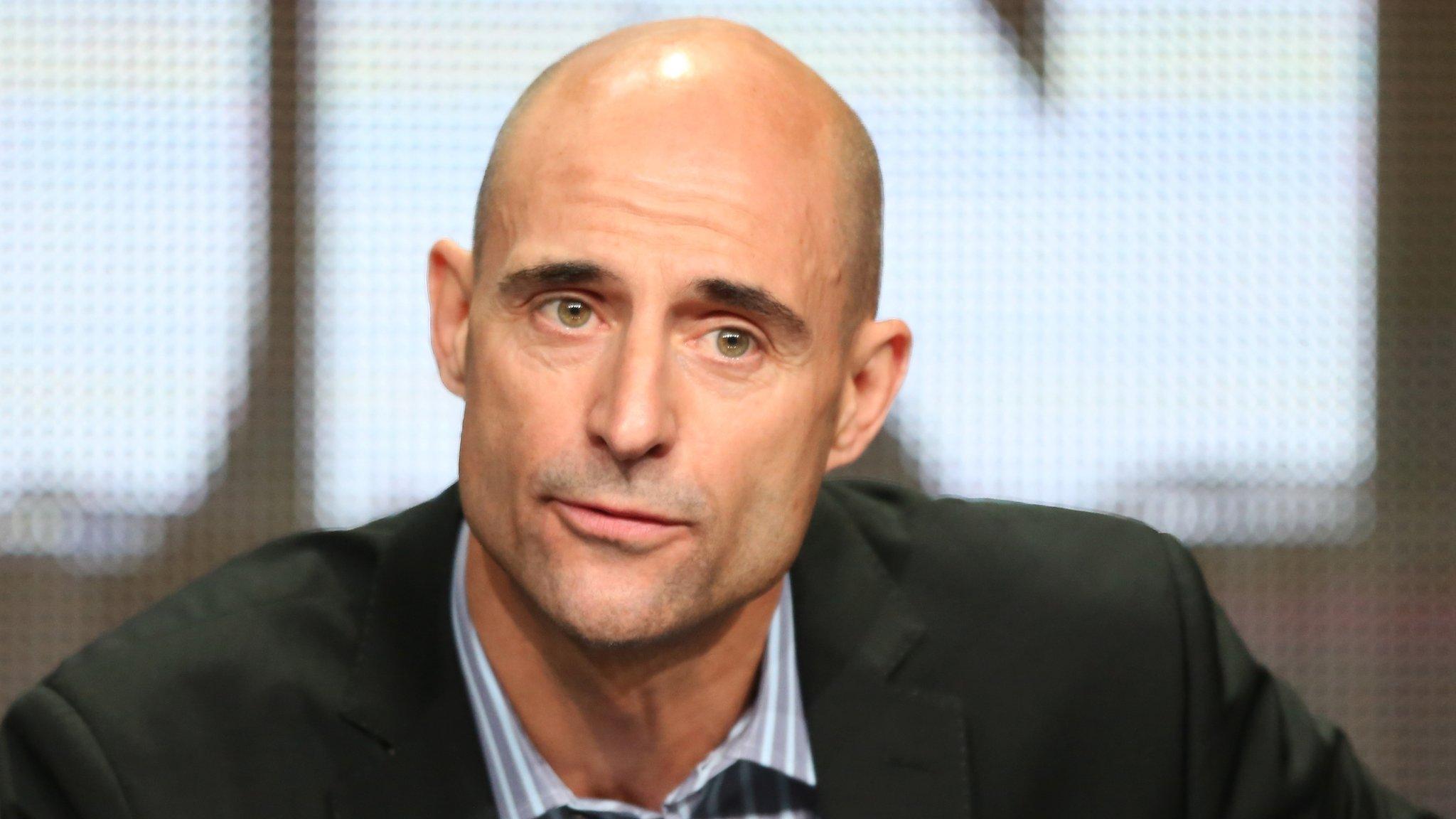Arthur Miller: A hundred years young
- Published
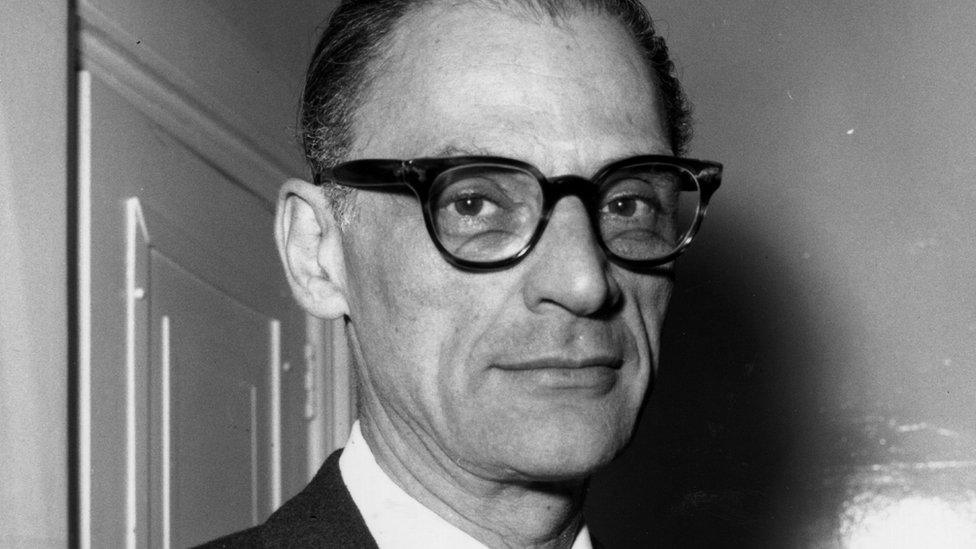
Had he not died in 2005, Arthur Miller would not only have celebrated his 100th birthday on 17 October this year.
The celebrated US playwright would also have had cause to celebrate the fact that his work remains as popular as ever.
Since June 2014, London's West End has hosted revivals of three of his most celebrated plays - The Crucible, A View from the Bridge and Death of a Salesman.
This year too, The Hook - a previously unperformed work from 1950 - was staged by the Royal and Derngate in Northampton and Liverpool's Everyman Theatre.
To mark Miller's centenary, actors, directors and writers explain why they believe his work has such enduring appeal.
It doesn't date
In an 1958 introduction to his plays, Miller notes that theatre has not changed since the days of Aeschylus. "A Greek's seat was harder than an American's, and even he had to call a halt to a dramatic presentation after a couple of hours."
Six decades after those comments, Sir Antony Sher - Willy Loman in the Royal Shakespeare Company's 2015 production of Death of a Salesman - is one who notices the freshness of his plays.
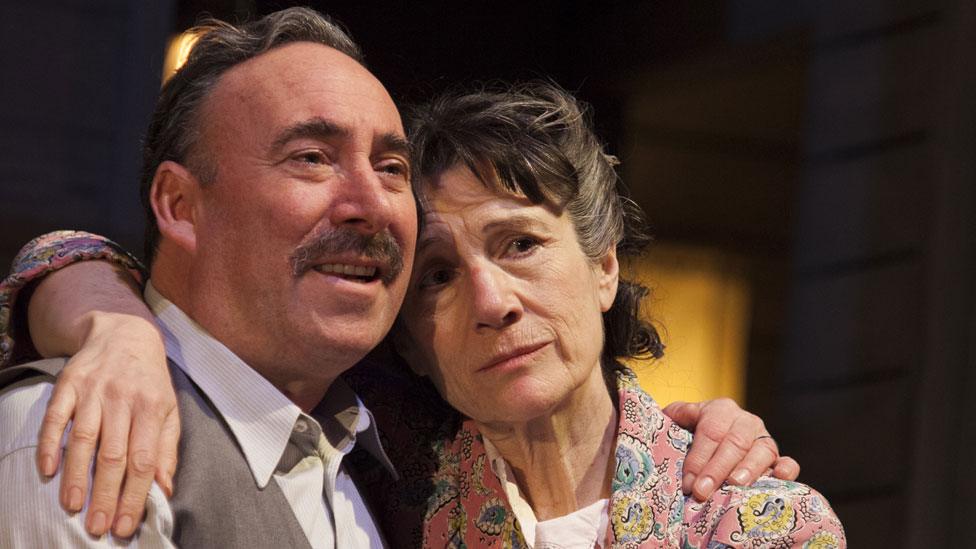
Sir Antony Sher recently appeared with Dame Harriet Walter in Death of a Salesman
"Miller writes about the experience of being human in a very raw but very compassionate way. We recognise ourselves in his characters, and that's a timeless thing.
"In this respect, Miller is like Shakespeare. You don't need an excuse to do Hamlet or [King] Lear; contemporary circumstances don't need to be right to make those plays relevant. I feel the same about Miller's work."
Linda Emond, who starred opposite Philip Seymour Hoffman and Andrew Garfield in a 2012 staging of the play, recalls that director Mike Nichols used the same set design as the original 1949 Broadway production.
"It's so brilliant and perfect that he thought, 'why change that?'"
You can identify with his characters
"He writes credible characters in eternal situations we can identify with," says playwright Sir Alan Ayckbourn, who directed Sir Michael Gambon in A View from the Bridge at the National Theatre in 1987.
Mark Strong, who won an Olivier award earlier this year for playing Eddie Carbone in the same play, expressed similar sentiments earlier this year. "Miller holds up a mirror and shows us, through the behaviour of other people, how we behave," he told the BBC.
"He maintains a world that is realistic," suggests Howard Davies, who has directed productions of Miller's The Crucible and All My Sons. "He makes tragedies out of the lives of ordinary people.
"They can either cope with these crises or buckle under them. That's a world we recognise."
He deals with big, often contemporary themes
In 1953, Miller devised a play based around the Salem witch trials which had undeniable contemporary echoes with the McCarthy era and the investigations conducted by the House Un-American Activities Committee.
"The writing of The Crucible is an extraordinary way of confronting the hysteria in early '50s in America, and the metaphor he found was perfect," reasons Davies. "You just realised that we haven't changed."
All My Sons, on the face of it, is a drama about a father who risks the break-up of his family after it emerges that his company sold defective equipment to plane manufacturers during World War II.
"He was confronting in that play the way that America grew wealthy out of the Second World War," Davies explains. "World War II made America rich and on the back of what?
"The play is not just one man's flaw, it's a metaphor for the whole of America. We took massive risks with our principles in order to make money."
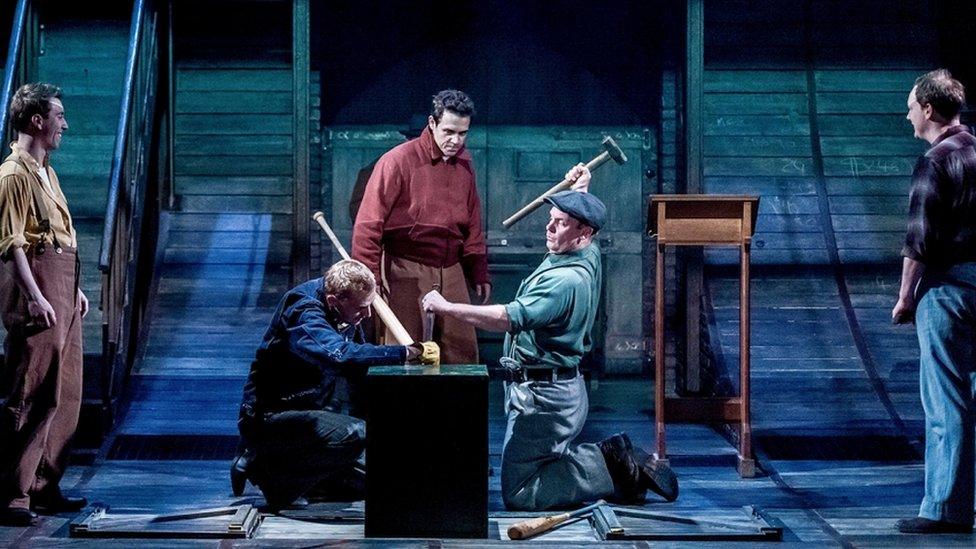
The stage version of The Hook was based on an unperformed film script
The Hook, an unperformed film script that dealt with workforce exploitation and union in-fighting in 1950s New York, similarly chimed with contemporary concerns when it reached the stage this year.
"Just as Brooklyn was a great melting pot during the post-war period, so too Northampton and Liverpool are home to a great diversity of cultures and industries today," says the play's director James Dacre.
"They are both experiencing the same kind of tensions between old and new, liberal and conservative, long-established and newly arrived that the world of Miller's script depicts."
According to Dacre, The Hook "evokes memories of a time when Liverpool's docks and Northampton's factories were suffering from similar labour conflicts."
Technically intricate plots
Zoe Wanamaker, who starred in Davies' Miller productions and recently played Linda Loman in a Radio 3 production of Salesman, feels that "the simplicity of what he does is masked by the incredibly careful plotting."
Linda Emond concurs. "Working on Death of a Salesman required both a precision and also a depth of work that was incredibly demanding."
Miller, she continues, "is a master of structure and storytelling."
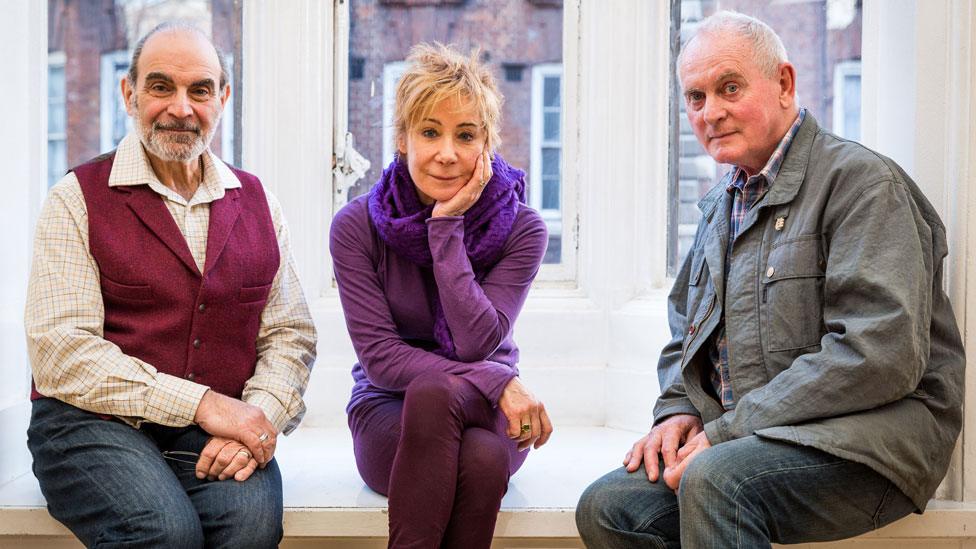
Howard Davies (right) directed Suchet and Wanamaker in Radio 3's production of Salesman
Great parts for actors
"Linda and Kate are both fierce and fearless in seeking to protect their mate," adds Wanamaker. "Miller surrenders the stage to Linda at the end of Death of a Salesman.
"His work has a strong sense of justice, and his sense of honesty. That connects with men and women."
Howard Davies supports this theory. "Miller is writing for actors who are facing their own inadequacies. It's Greek. It's epic. Actors know they are going to be mightily challenged. But when it comes off, it's great."
Just before his death, Pete Postlethwaite was in discussions with director Rupert Goold about playing Willy Loman - a part previously attempted by Lee Cobb, Rod Steiger and Dustin Hoffman, on television and on stage.
"Actors want to play Miller's characters because they are great roles, full of complexity," says Sir Anthony Sher, who called playing Loman "immensely demanding and tiring".
"Yet there is also something about his journey - his fight to survive, his struggle to avoid the inevitable - that is exhilarating."
Strong, who says he "would love to play Willy, no question", is even more direct. "Actors understand it is a part that can make you laugh and cry at the same time."
Intensity
With their flawed central characters rushing headlong towards their own demise, Miller's plays are often compared to Greek tragedies - something that takes its toll on those who perform the plays.
Playing Loman at high school was one of the factors credited with giving Philip Seymour Hoffman the acting bug. But his Tony-nominated reprisal of the same part was his final stage role.
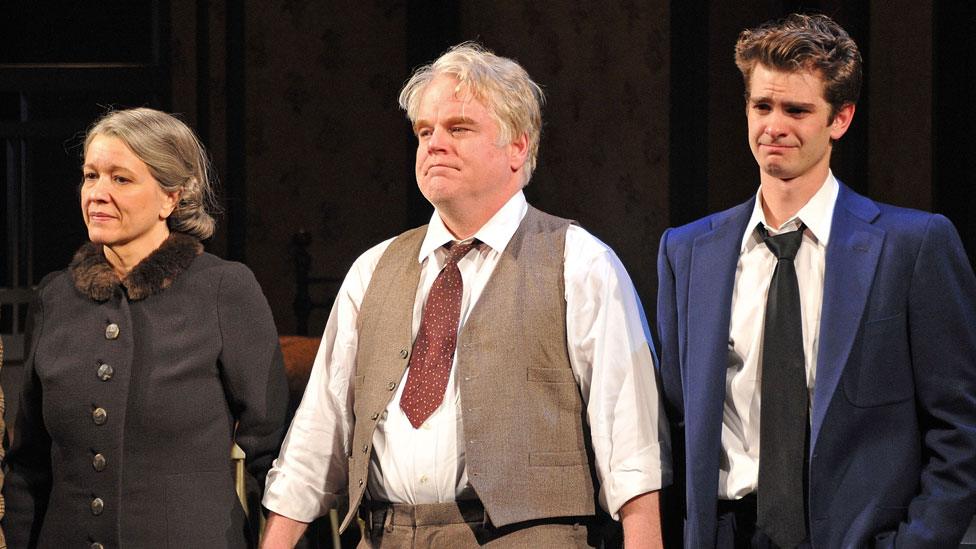
Linda Emond appeared with Philip Seymour Hoffman (centre) and Andrew Garfield in Salesman
"That play tortured him," his close friend, playwright David Bar Katz, told Rolling Stone magazine shortly after the actor's 2014 death. "When it was over, he said to me that he wasn't going to act in theatre for a while."
Linda Emond agrees Salesman was a challenging job. "It was both thrilling and terrifying every night to face that play. It was for all of us. There was dread every night.
"Mike [Nichols]' strength was that he pulled us all together; he asked the right questions, he told us the right stories. It made for the right ambience.
"Also, Mike was hysterically funny. And sometimes that was just necessary with that play - to keep us all sane."
Sir Alan Ayckbourn was well aware of this intensity when he worked on A View from the Bridge. "If you were to ask me the discussions we had around the play, I'd think basically only one really," he recalls.
"This is liable to be such a gloomy evening, we'd better try and get as many laughs out of it early on - because they certainly won't be laughing by the end."
No meddling
Many of the interviewees met Miller. When planning his National Theatre production of The Crucible, though, Howard Davies made it to his living room.
"I wrote a letter to him long before the days of email and went to his apartment. He made me coffee which was undrinkable, and I sat on the incredibly uncomfortable furniture which he had made.
"I thought he would probably grace me with half an hour. Three-and-a-half hours later, I emerged having had this incredible debate with him.
"In London, he sat down with the cast having seen a preview. He didn't want to intervene in their world, but he did talk about the characters and their dilemmas.
"The cast was initially in awe and after an hour, it had turned into a free-form debate."
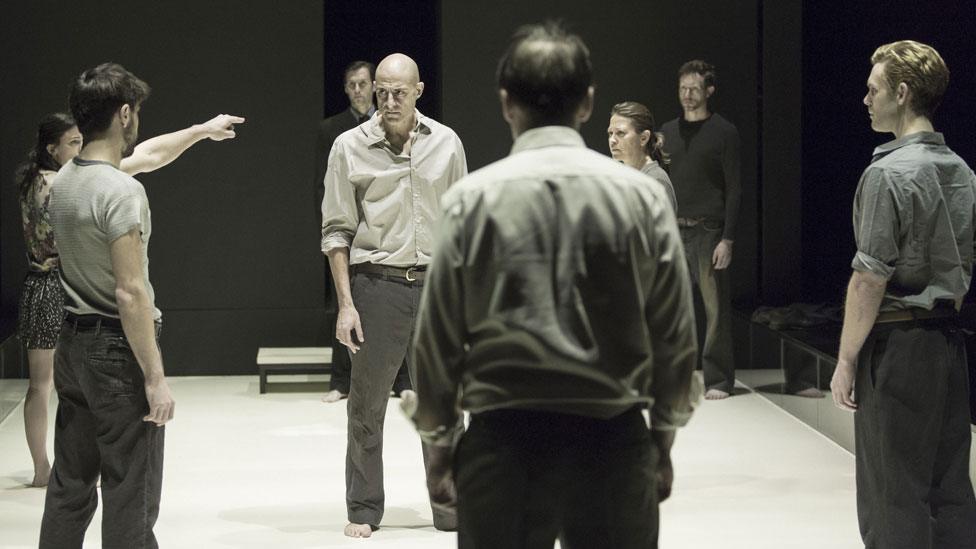
Mark Strong (centre) won a number of awards, including an Olivier, for playing Eddie Carbone
Mark Strong met Miller in Salzburg while playing Willy Loman's son Biff in the National's 1996 production of Death of a Salesman. "He did not say 'this is my play, here is how it should be'," the actor remembers.
"He was very open to what we felt we wanted to bring out in our roles for this production."
Sir Alan Ayckbourn, though, has more mixed memories of meeting the man who was once married to Marilyn Monroe, once the most photographed woman in the world.
"He was courteous and enthused about the production [of A View from the Bridge]. I recall in the restaurant afterwards he held Gambon's hand aloft and announced 'The best Eddie EVER!'
"Mike [Gambon] and I sat either side of him and couldn't think of anything to say to him apart from 'what was it like being married to HER?' Philistines!"
BBC Radio 3, 4 and 4 Extra are currently running an Arthur Miller season, which includes the broadcast premiere of Miller's unproduced screenplay The Hook, and Alfred Molina leading the cast in Radio 3's A View From a Bridge.
- Published13 February 2015
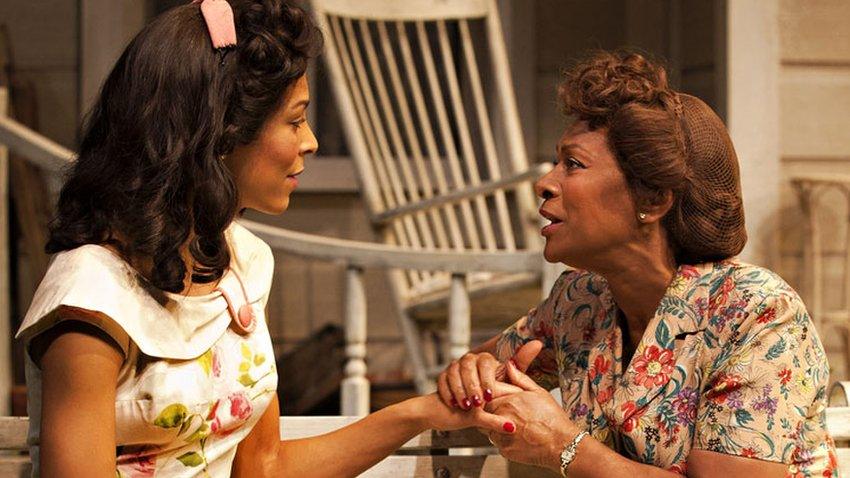
- Published24 November 2014
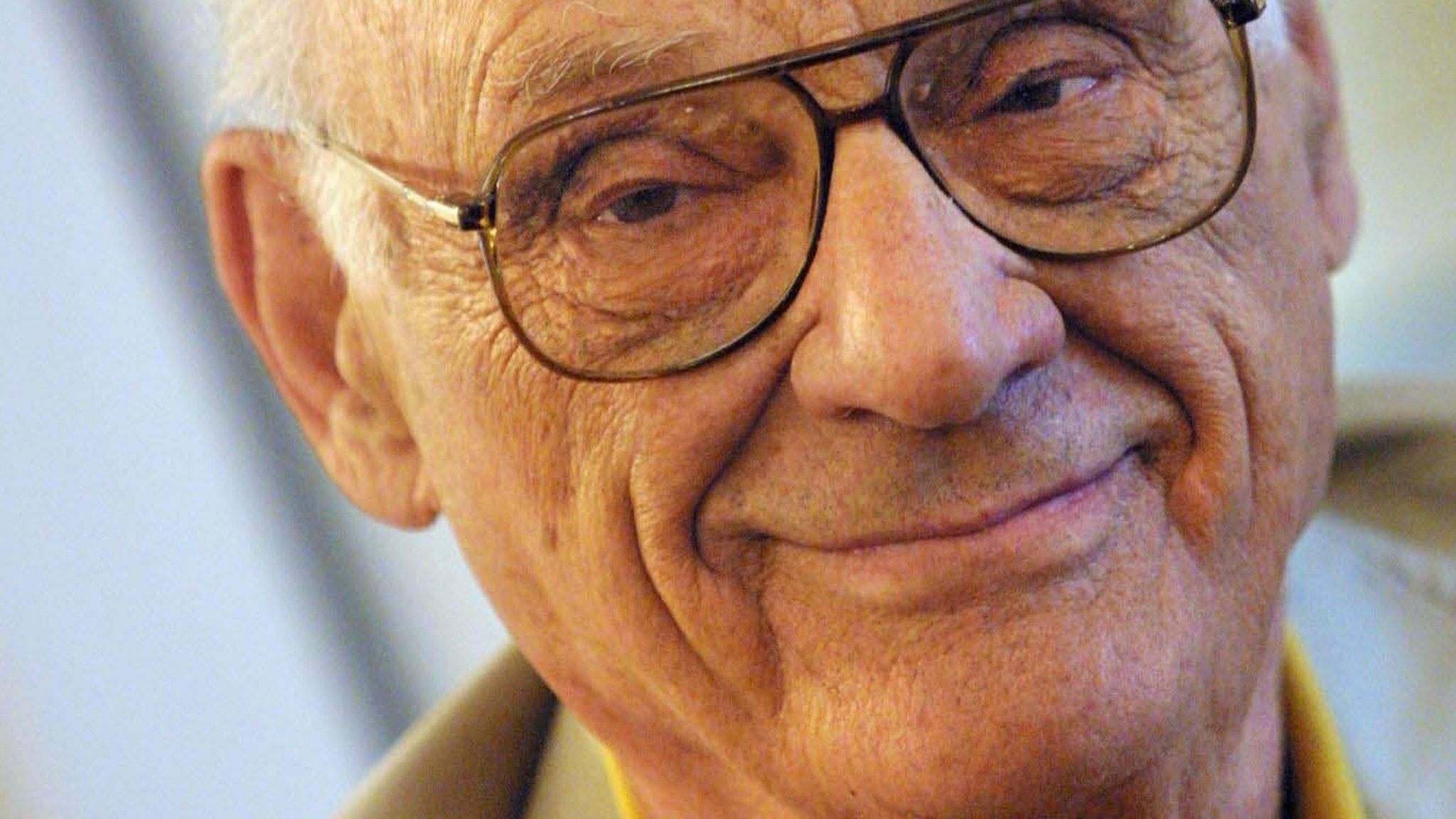
- Published14 January 2014
